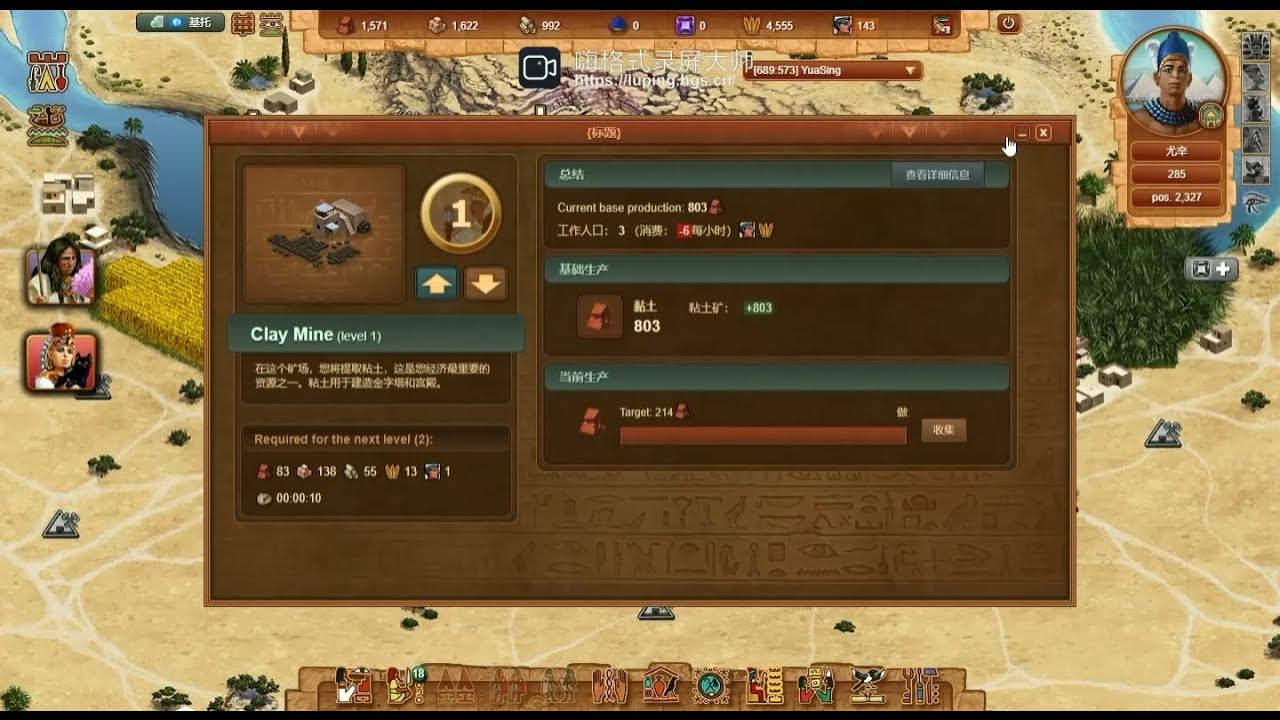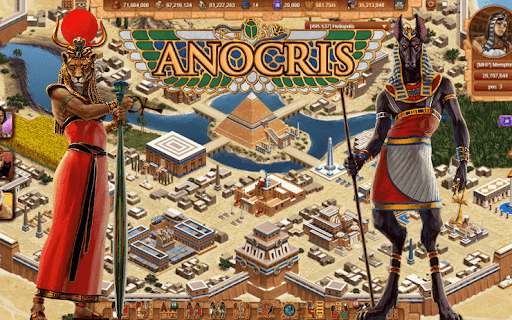
Anocris
| Genre: Strategy |
| Rating: |
Anocris Review: A Strategy Game That Moves at the Pace of the Nile
Ever wondered what it feels like to rule beside the Nile, juggling sorcery, strategy, and sun-scorched ambition? Anocris doesn’t just simulate ancient Egypt—it invites you to live it, hour by meticulous hour.


The Vibe Check: What is Anocris, Really?
Imagine this: you’re dropped into the middle of a dusty plain by the Nile, handed a few villagers, and told, “Alright, Pharaoh, start building.” No glitzy intro, no explosions—just you, sand, and the weight of history. That’s Anocris in a nutshell.
It’s a real-time strategy game, sure, but it’s got that browser-game soul. You’re not here for fast dopamine hits. You’re here to slowly, deliberately shape a civilization, brick by brick. And honestly? It grows on you. Like a creeping vine—or, well, maybe a stone temple rising stubbornly over decades.
The game world is steeped in ancient Egyptian aesthetics. We’re talking sandstone textures, lotus motifs, and crisp, hieroglyphic fonts. Even the music hums with distant drums and mystical flutes, which might sound cheesy, but oddly—it works. The moment you log in, there’s a certain stillness that feels oddly meditative.
Nile Dreams and Strategy Streams: Gameplay at a Glance
Let’s get this straight: if you’re the kind of player who wants instant results, Anocris is probably not going to sweep you off your feet. It plays in real time, and I mean real time. Build a structure? Wait 30 minutes. Upgrade your Temple of Thoth? Better check back after dinner.
But if you’ve ever played games like Travian, Ikariam, or the old-school OGame, this will feel warmly familiar. There's something strangely satisfying about logging in the next morning to see a new building standing where there was once empty sand.
Your job as Pharaoh isn’t just to build. It’s to manage. You’ll juggle workers, resources (stone, bread, and... you guessed it, papyrus), military units, and divine blessings. There's a lot of planning. A lot of watching timers. And a surprising amount of satisfaction when all your spreadsheets—or let’s be honest, gut feelings—pay off.
And that pacing? It’s weirdly thematic. Ancient Egypt didn’t pop up overnight. It was deliberate. Monumental. It waited for the river to rise before planting seeds. That’s kind of what Anocris does to you. It teaches patience—one limestone slab at a time.
Culture Clash and Clan Talk: Social Gameplay
Here’s where things get unexpectedly spicy.
Anocris has alliances, and they aren’t just decorative. These clans, or Nomoi, are integral to your survival and expansion. If you try to go solo, you’re basically setting yourself up to be raided into oblivion by a neighbor with more time—or spreadsheets.
Joining a good alliance isn’t just about strength in numbers. It’s about strategy, timing, and sometimes drama. There's a whole meta-game to clan politics: secret pacts, surprise attacks, resource trades, and the occasional backstab. Think Game of Thrones in linen robes.
And the chat? Surprisingly alive. Yes, it’s a bit clunky—like every old-school game chat ever—but there’s always that one player who's been around since 2018, ready to explain how to farm divine power more efficiently or complain about a recent nerf. It’s comforting.
What makes this layer compelling isn’t just the gameplay utility. It’s the feeling of shared toil. You're not just raising pyramids—you’re doing it alongside other sunburned, caffeine-addled players trying to beat the same timers as you.
Sands of Time: Progression, Patience, and Payoff
Progress in Anocris feels a bit like watching erosion in reverse. It’s slow, sure, but every time you upgrade your Sun Temple or research a new technology, it feels like an accomplishment. And I don’t mean that in a clickbait way. I mean you’ve genuinely waited, planned, maybe hoarded bread for two days—and now your chariots are 4% faster.
That tiny win? Weirdly exhilarating.
You’ll run into bottlenecks. Oh, you will. Papyrus production will stall out your entire tech tree. Divine power will mysteriously vanish right when you need it most. And food? Somehow always running low, like your virtual granaries have holes in them. But that's part of the rhythm.
There’s a strange sense of emotional pacing here. Frustration builds slowly, like a rising flood—only to be washed away by that satisfying click when a long-term goal finally completes. That’s the dopamine hit. It’s not flashy, but it’s real.
Rituals, Raids, and Ra Gods: Magic System and Combat
Now, let’s talk about the weird, wonderful magical layer that’s tucked between your grain silos and barracks.
Anocris isn’t just swords and bread. It’s got spells. Ancient Egyptian-style ones. You can literally invoke divine favor, summon plagues, or call upon the gods for blessings. It’s not just thematically cool—it adds another tactical lever.
Combat is mostly number-based, but the inclusion of spells gives it a spicy twist. Raids, in particular, have this anxious anticipation—you set your troops on a mission, wait real-time for the return, and then... bam. You either come back rich or broken. Sometimes both.
This isn’t Total War-level action, mind you. There’s no animation of chariots crashing through enemy lines. But in a way, that fits. The abstraction forces you to think long-term. To prepare.
And let’s be honest, there’s something deliciously nerdy about casting a protective spell right before an alliance raid. Like wrapping your army in bubble wrap, ancient Egypt-style.
UI, Bugs & Bare Bones Moments
Alright, let’s get a bit critical.
Anocris isn’t exactly winning design awards for its interface. It’s functional, sure, but clunky. You’ll find menus tucked in odd corners, tooltips that vanish if you so much as blink, and lag that creeps in during larger battles or alliance wars.
The mobile version? It exists. Technically. But if you’re serious about playing, stick to a browser. Trust me. The experience is just smoother, more responsive, and honestly—less prone to freezing during spellcasting.
And bugs? You’ll run into a few. Nothing game-breaking, but definitely eyebrow-raising. Like a unit that refuses to return from a raid, or a resource counter that flickers like it’s haunted. It’s part of the charm, or the frustration, depending on your patience that day.
Casual Pharaoh or Hardcore Strategist: Who’s This For?
This part matters—because Anocris isn’t for everyone.
If you’ve got a demanding day job, a toddler who thinks sleep is optional, and only ten spare minutes a day? You can play Anocris. But it’ll be slow-going, like carving hieroglyphs with a spoon.
But if you’re the kind of person who likes leaving browser tabs open all day while working, checking in now and then to queue up an upgrade or send a raid? Then this game fits your lifestyle like a comfy old hoodie. It's perfect in the background, steadily unfolding.
And for the hardcore strategy crowd—there’s depth here. Not flashy esports depth, but quiet, spreadsheet-depth. Optimization. Prediction. Alliance diplomacy. It’s there, just buried under sand and timers.
So, Should You Play Anocris?
Here’s the thing.
Anocris isn’t the hottest game on the market. It’s not going to trend on TikTok or crash Steam on launch day. But what it does—slow, patient strategy, laced with myth and magic—it does with an almost stubborn authenticity.
It’s a niche game for a niche mood. For days when you want to build something that lasts. When you’re tired of speedruns and flashbangs and just want to quietly scheme beneath a virtual sun.
So should you play Anocris?
If you’re curious, patient, and maybe just a little obsessed with ancient Egypt—yeah. Give it a shot. Worst case, you’ll waste a few afternoons watching bread counters tick up. Best case? You’ll find a second digital home somewhere along the Nile.